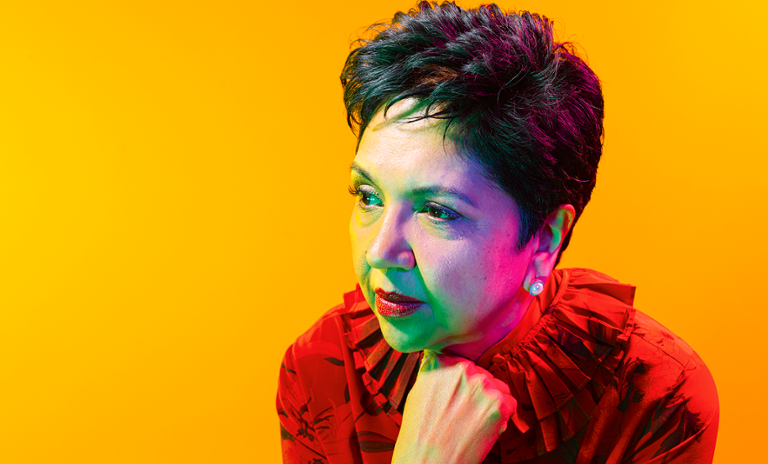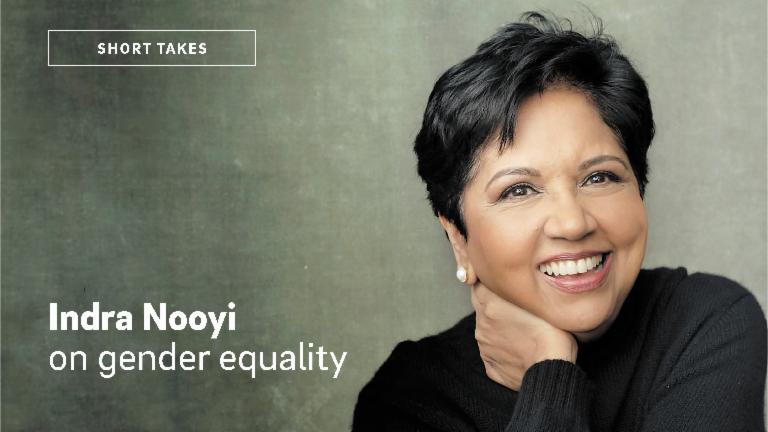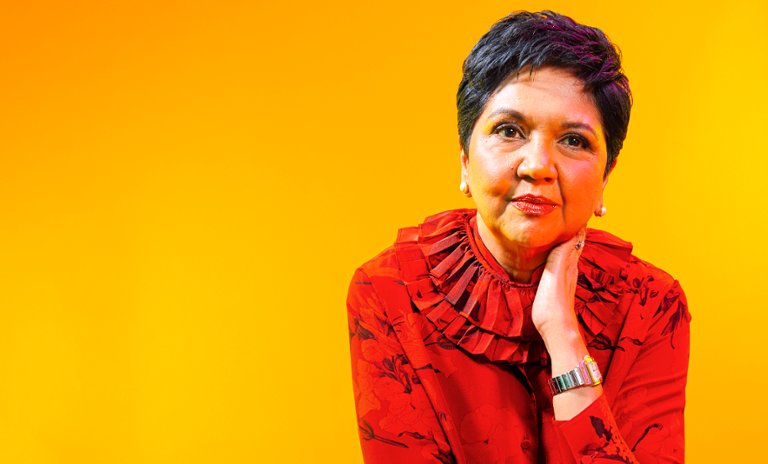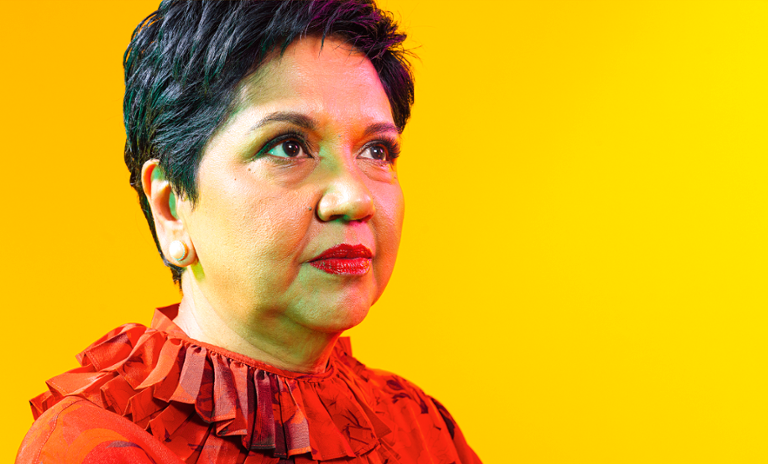Circular economy
![{[downloads[language].preview]}](https://www.rolandberger.com/publications/publication_image/roland_berger_ta37_cover_en_download_preview.png)
As the idea of sustainability becomes more mainstream, Think:Act shows how organizations can smoothly transition from a linear to a circular economy.



Indra Nooyi, former CEO of PepsiCo, has transformed her personal lessons from balancing a high-flying career with raising a family into a call on businesses and government to help families thrive.
At a time when Indian Americans run some of the United States' most well known companies, a list including Alphabet, Microsoft and IBM, it's easy to forget this is a new phenomenon. When Indra Nooyi was appointed CEO of PepsiCo in 2006, she was not only one of the first immigrants to run a Fortune 500 company, she was also among the first women. Born in the Indian city of Madras (known since 1996 as Chennai), Nooyi first studied in India before moving to the United States to study public and private management at Yale University. A renowned hard worker, she then quickly climbed the corporate ladder, moving from management consultancy to roles at Motorola and ABB. She joined PepsiCo in 1994, working in strategy and then as CFO, before taking the top job after 12 years at the food and beverage giant.
The same year, Nooyi introduced 'Performance with Purpose' (PWP) – one of the most successful strategic redirections in the company's history and a pioneering benchmark for corporate sustainability programs. PWP focused on boosting financial returns while making products healthier and improving sustainability while expanding diversity and family support within the company. When Nooyi stepped down as CEO in 2018, PepsiCo's net revenue had grown by 80%. PWP continues to guide the company's vision today. In her book My Life in Full, released in 2021, Nooyi, a mother of two, recounts the huge challenges of balancing a high-flying career with raising a family. She also highlights the need for business and government to reshape care infrastructures to help families and economies thrive.

You grew up and then worked in two very different cultures, particularly in terms of the role of women. How difficult was it to balance the two throughout your career?
I was lucky enough to grow up in a very progressive family that wanted women to study, to work. I was a product of the world's largest democracy and a family that believed women were equal to men, that we were allowed to soar and dream and do whatever we wanted. I carried those beliefs with me to the US. But I also knew there was a frame that I should operate within. I wasn't out partying all the time and I worked hard. I wanted to show that I will never, ever bring disrepute to my family or even to the Indian community. Throughout my career, the importance of women in the workplace was constantly improving. So, I benefited from that over time. And I was also part of the group that started to make those changes.

But there's still work to do …
I'm afraid so. Just to give you an idea: 70% of high school graduates in the United States are women; and more than 50% of college degrees are received by women. This says to me that there is an incredible talent pool of women. Yet, I look at Silicon Valley and just 2.3% of funding goes to female founders. And, in corporations, as you move up the ladder, women drop out in large numbers because there's just no support system for them, and they still feel there's a lot of unconscious bias in the workplace. So, we need to create a more female-friendly environment and a better care infrastructure to support families. And all people in power, men and women, have to adopt a gender-blind approach to selecting, developing, retaining and promoting talent. Unfortunately, that's easier said than done because people tend to believe that when somebody else looks like you and has a similar background, it's easier to interact with them. But easier doesn't mean better. When you have diverse voices around the table, it typically leads to a better decision-making process and outcome.

What do you think of quotas for female workers?
It's a double-edged sword. I think it's important to have quotas to start with because you can't really practice inclusive behavior unless you have enough people to practice on. You need a critical mass of diversity to then start saying we want to be inclusive. So, stage one is setting quotas, doing inclusion training, and then you build from there. And as CEO, you have to set the standard for inclusive, empathetic behavior. The days of the imperial CEO are gone.
Indra Nooyi served as chairperson and CEO of PepsiCo from 2006 until 2018 and was the first woman of color and immigrant to lead a Fortune 50 company. Consistently ranked on "world's most powerful women" lists, her 2021 book My Life in Full functions as a memoir and a strategic call to action based on her experience of what is possible when companies care about family.
You dedicated an incredible amount of time and hard work to your career, which meant sacrificing time with your family. "In some ways, I think of these days with great sadness," you wrote in your book. How did you feel about it at the time? Did you enjoy it or was it just something you felt you had to do?
I'm just wired a certain way. When I see a problem I think I can help with, I want to jump in both feet first. Whether it's the company, the community or any entity I'm involved in. If I can contribute, why not? It's nothing to do with wanting to get ahead or prove anything. I don't want the credit. But does that take away a lot of personal time? Yes, it does. At almost every point, I put the company ahead of myself. And it also causes your brain to be thinking about the problem all the time. You're not in the moment when you're in other situations. So, yes, I do look upon those days sometimes with sadness and wonder why I'm wired that way. Even today, in retirement, I'm finding myself doing the same thing. But you know, as somebody told me recently, you are what you are.
Do you have any regrets?
You know what I regret the most? I wish I'd been CEO at a time when all these communications technologies existed. Then I wouldn't have traveled as much as I did. I wouldn't have had to.

"Unfortunately, people tend to believe that when somebody else looks like you and has a similar background, it's easier to interact with them. But easier doesn't mean better."
Indeed, things changed a lot in the last couple of years. Many workers now have greater flexibility. But there are still plenty for whom remote work isn't an option. Do we need to be mindful of not creating a two-tier system?
We have to think about both groups of people with great care and sensitivity. The time has come for us to recognize that essential workers enable us to have a certain quality of life. For hourly workers, it's important to give them shift predictability. People have caregiving responsibilities. And we have to think about support structures for their families. What kind of caregiving infrastructure can we give them? What kind of wages should we pay them? Let's not forget that productivity gains over the last few years are largely down to the combination of automation and wage caps. There has been very little progress for the essential worker over the last two years. So, we will have to go back and rethink what kind of benefits to give them. Should we provide care services attached to the place of work or near where they live? Do we offer sufficient paid leave? We need to make it easy for young family builders. And here's the thing: Many of these essential workers that have the human touch – nurses, caregivers, teachers – are female-focused jobs. If we don't figure out a support structure for them, I think you'll have more women with mental stress. It's too much.
"Companies have a duty. We can't just ignore people and treat them as the state's responsibility. I think capitalism needs to start coming to terms with that."
Do you see this as a way in which businesses could set themselves apart in the current war for talent?
Companies have a duty of care to their societies. We can't just ignore people and treat them as the state's responsibility. I think capitalism needs to start coming to terms with that. This means, businesses need to think about reskilling. Everyone is wringing their hands, saying, "Oh my God, we have the great resignation. Workers are all leaving their jobs." But I want to talk about the great reenrollment and how we get them back. That means creating an environment in which everybody can contribute. Make sure there's parity between genders and ethnic groups for doing the same jobs. Don't ever have a situation where any group feels marginalized or treated differently. That's very, very important. And find a way to send the message that, as a business and a leader, your focus is solely on the best talent.
Lastly, your book is called My Life in Full, but you've said it's about much more than that. What do you mean by that?
I didn't write it as a memoir – I wrote it as a story with an arc of life to inform a series of policy options on care, paid leave and improving flexibility in work and life. So, I hope people read it for what this means for society going forward, as opposed to saying it's a story of an interesting person. It's more than that. What are the consequences of the book? What does it mean for society? What changes need to be made? I always tell people, this should be viewed as our book, not my book.

![{[downloads[language].preview]}](https://www.rolandberger.com/publications/publication_image/roland_berger_ta37_cover_en_download_preview.png)
As the idea of sustainability becomes more mainstream, Think:Act shows how organizations can smoothly transition from a linear to a circular economy.
